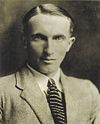
Achill Island is the largest of the Irish isles and lies off the west coast of Ireland in County Mayo. It has a population of 2,345. Its area is around 148 km2 (57 sq mi). Achill is attached to the mainland by Michael Davitt Bridge, between the villages of Achill Sound and Polranny. A bridge was first completed here in 1887. Other centres of population include the villages of Keel, Dooagh, Dooega, Dooniver, and Dugort. The parish's main Gaelic football pitch and secondary school are on the mainland at Polranny. Early human settlements are believed to have been established on Achill around 3000 BC. The island is made up of 87% peat bog. The parish of Achill consists of Achill Island, Achillbeg, Inishbiggle and the Corraun Peninsula.

The legacy of the Great Famine in Ireland followed a catastrophic period of Irish history between 1845 and 1852 during which time the population of Ireland was reduced by 50 percent.

Irish literature is literature written in the Irish, Latin, English and Scots languages on the island of Ireland. The earliest recorded Irish writing dates from back in the 7th century and was produced by monks writing in both Latin and Early Irish, including religious texts, poetry and mythological tales. There is a large surviving body of Irish mythological writing, including tales such as The Táin and Mad King Sweeny.

John William Ponsonby, 4th Earl of Bessborough, PC, known as Viscount Duncannon from 1793 to 1844, was a British Whig politician. He was notably Home Secretary in 1834 and served as Lord Lieutenant of Ireland between 1846 and 1847, the first years of the Great Famine.

Liam O'Flaherty was an Irish novelist and short-story writer, and one of the foremost socialist writers in the first part of the 20th century, writing about the common people's experience and from their perspective.

Connemara is a region on the Atlantic coast of western County Galway, in the west of Ireland. The area has a strong association with traditional Irish culture and contains much of the Connacht Irish-speaking Gaeltacht, which is a key part of the identity of the region and is the largest Gaeltacht in the country. Historically, Connemara was part of the territory of Iar Connacht. Geographically, it has many mountains, peninsulas, coves, islands and small lakes. Connemara National Park is in the northwest. It is mostly rural and its largest settlement is Clifden.
Claddagh Records is a record label, based in Dublin's Temple Bar area, founded in 1959 by Garech Browne and Ivor Browne. It specialises in Irish traditional music and spoken word. Garech had been taking lessons at the time from the master piper Leo Rowsome, who had made many recordings in the 1920s and 1930s with H.M.V. and Decca, was to be the first artist to record on the Claddagh label. Leo, on the first-ever Claddagh album "Rí na bPíobairí", produced virtuoso uilleann piping. The second album released by Claddagh was The Chieftains' first recording who are most arguably well-known artists in their roster.
Events from the year 1998 in Ireland.

Brendan Gleeson is an Irish actor and film director. He has received various accolades, including two British Independent Film Awards and a Primetime Emmy Award, along with nominations for an Academy Award, three BAFTA Awards and five Golden Globe Awards. In 2020, he was listed at number 18 on The Irish Times list of Ireland's greatest film actors. He is the father of actors Domhnall Gleeson and Brian Gleeson.

O'Flaherty is an Irish Gaelic clan based most prominently in what is today County Galway. The clan name originated in the 10th century as a derivative of its founder Flaithbheartach mac Eimhin. They descend in the paternal line from the Connachta's Uí Briúin Seóla. They were originally kings of Maigh Seóla and Muintir Murchada and as members of the Uí Briúin were kinsmen of the Ó Conchubhair and Mac Diarmada amongst others. After their king Cathal mac Tigernán lost out to Áed in Gai Bernaig in the 11th century, the family were pushed further west to Iar Connacht, a territory associated with Connemara today. They continued to rule this land until the 16th century. The name has been alternatively rendered into English in various forms, such as Flaherty, Fluharty, Faherty, Laverty, Flaverty, Lahiff, and Flahive.
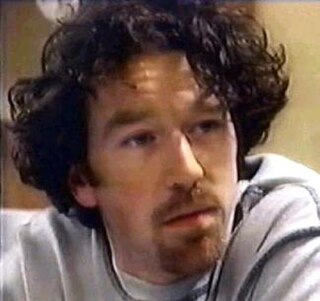
Conor Flaherty is a fictional character from the BBC soap opera EastEnders, played by actor Seán Gleeson from 22nd September 1997 to 22nd February 1999. The character first appeared in a special week of episodes set in Ireland, the first broadcast in 1997.
Tom Maidhc O'Flaherty was an Irish Communist politician in the early 20th century, a supporter of the Trotskyist James P. Cannon, and writer in English and Irish. In 1919, he, along with John Reed, Jim Larkin and others, helped to create the Communist Labor Party, a precursor to the Communist Party USA.

In 1997, the BBC soap opera EastEnders broadcast three singular transmissions that were filmed on location in Dublin, Ireland. The episodes involved the Fowler and Beale family travelling from London to Ireland to meet their long-lost relatives. The episodes were badly received by viewers and heavily criticised in the media. The BBC was inundated with complaints from angry viewers from Ireland for negative stereotyping, portraying Irish people as "dirty, rude, and drunk". Complaints were made by the Irish Embassy and there were fears that the episodes would have a negative effect on the Irish tourist trade. The BBC was forced to issue an apology for causing offence.
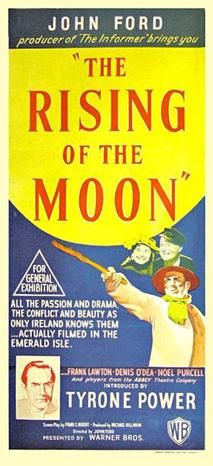
The Rising of the Moon is a 1957 Irish anthology film directed by John Ford. It consists of three episodes all set in Ireland:

The chronology of the Great Famine documents a period of Irish history between 29 November 1845 and 1852 during which time the population of Ireland was reduced by 20 to 25 percent. The proximate cause was famine resulting from a potato disease commonly known as late blight. Although blight ravaged potato crops throughout Europe during the 1840s, the impact and human cost in Ireland – where a third of the population was entirely dependent on the potato for food but which also produced an abundance of other food – was exacerbated by a host of political, social and economic factors which remain the subject of historical debate.

Domhnall Gleeson is an Irish actor and screenwriter. He is the son of actor Brendan Gleeson, with whom he has appeared in a number of films and theatre projects. He received a Bachelor of Arts in Media Arts from Dublin Institute of Technology.
Maidhc Ó Flaithearta was a member of the Irish National Land League and father of Liam O'Flaherty, fl. 1882.
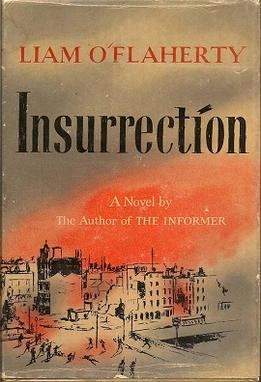
Insurrection is a 1950 novel by the Irish novelist Liam O'Flaherty. The story takes place during the Easter Rising in Dublin in 1916.

Brian Gleeson is an Irish actor. He was nominated for an Irish Film and Television Awards for the television series Love/Hate. He has appeared in Snow White and the Huntsman (2012), Assassin's Creed (2016), and had regular roles in The Bisexual (2018), Resistance and Peaky Blinders (2019), Frank of Ireland (2021), and Bad Sisters in 2022.
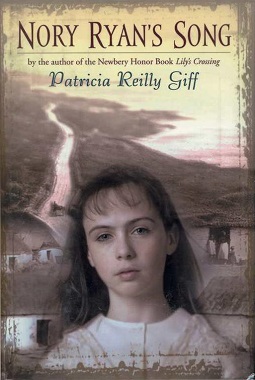
Nory Ryan's Song, by Patricia Reilly Giff, is about a 12-year-old girl named Nory Ryan who lives through the Great Famine in Ireland in 1845. When her own beloved sister, Maggie leaves for America, Nory is left with her younger brother Patch, sister Celia, and her Grandpa until their father comes back from a fishing trip. While Nory struggles to find food, money, and pay the ever increasing rent, he father still doesn't come back. She meets Anna Donnelly, an old woman who has a knack for herbs and healing. Can Nory and her family survive the famine?
















